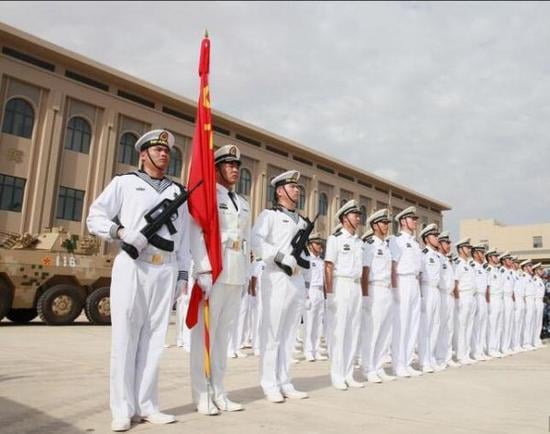

Chinese sailors at the People’s Liberation Army Navy base in Djibouti in 2019. Xinhua Photo
A team of researchers have identified likely locations of future Chinese naval bases not only in the Indo-Pacific but as far away as the Atlantic coast of Africa.
China invested in a “whole swath of ports” through its decade-old Belt and Road Initiative, but it is not clear which one will be used for a future naval base, said Alexander Wooley, one of the study’s authors and director of partnerships and communications at AidData.
The study used open-source data, collected through 2021, to identify eight ports that could potentially be used as naval bases in the next two to five years by a blue-water Peoples Liberation Army Navy for sustained operations, Wooley said at the Heritage Foundation Tuesday. They are as close to China as Ream, Cambodia, and as distant as Bata, Equatorial Guinea, on the Atlantic.
The study’s authors wrote the selections were “based on a combination of factors, including the massive scale of China’s development financing in harbor infrastructure; the strategic value and location of ports; strong relationships with host country elites; voting alignment with China in the United Nations General Assembly; and port characteristics suitable for supporting naval fleets.”
China “is exercising naval statecraft” with its investments, said Brent Sadler, of Heritage’s Center for National Defense and author of U.S. Naval Power in the 21st Century. Wooley and Sadler agreed Beijing seems to be more interested now in geopolitical advantage, especially in terms of operations.
This can be seen in PLAN ships making distant port calls, as well as the deploying and continued building of aircraft carriers to protect its sea lanes of communication. Wooley said. China’s immediate military attention remains focused on Taiwan, Sadler said.
But any new bases will not automatically look like American overseas facilities or even its own in Djibouti. “They don’t have relations with countries,” like the United States has with Italy through NATO to operate in Naples. In ports like Naples, the American Navy has weapons stored, special fuels needed for aviation and surface vessels and facilities “to make highly sensitive repairs” in wartime, Sadler said.
The report notes that in wartime the eight ports the Chinese might use as bases would “become high-value targets” vulnerable to attacks. In addition, the host nations have small militaries, so the defense burden would fall largely fall on Beijing.
China is also looking at commercial ports, which could be put to hybrid use “to support the military,” Sadler said. “That’s what we see playing out.”
The selling point for the Chinese to other nations is “we are like you” [and] we are not colonialists,” Wooley said. For the Chinese, there a convergence of economic and geopolitical interests in building port infrastructure.
Wolley said several times that the data the study worked from reflected investments by the Chinese government or state-supported businesses.
The study did not include increased Chinese attention and involvement in the Solomon Islands because of the cut-off point on the data collection and analysis, Wooley said. It did include Vanuatu “to break containment and establish a base in the South/Central Pacific to counter concentric island chains.”
In 2022, China reached an agreement with the Solomons on some basing rights, but how extensive its presence will be is unclear. Any basing in the Solomons could be similar to what China has in Cambodia: “get in and get out,” Sadler said.
No site in Russia made the list because so much of Chinese port investment there has been for energy movement through the Northern Sea Route in the Arctic. Since the two increasingly conduct naval exercises together, Wooley added it would be possible for Beijing and Moscow to reach an agreement to co-locate operations.
The study said China could use that approach with other like-minded nations.
“In some ways, what would make more sense for China would be a security and naval treaty with a country like Iran, Russia, Syria, or Venezuela—all nations that have the lowest coincidence of UNGA [United Nations General Assembly] voting alignment with the US of any in the world. An agreement with one of these countries could have as its centerpiece a basing component,” reads the study.






